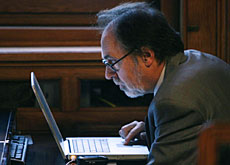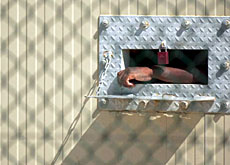The Swiss charged with investigating the CIA

The man charged with investigating alleged CIA prisons in Europe has made a career out of hunting criminals, and has never shied away from controversy.
In an interview with swissinfo, Dick Marty described himself as a “loner” – fitting for a man who led efforts to decriminalise drugs in Switzerland and to allow euthanasia in Europe.
Marty, 60, a senator for Switzerland’s centre-right Radical Party, was appointed in November by the Council of Europe to probe allegations that the CIA set up secret prisons in eastern Europe to interrogate terror suspects.
Almost from the outset, Marty made clear he was taking no prisoners. A little over a month after he was appointed, he said publicly that there were indications “that individuals had been abducted [in Europe] and transferred to other countries without respect for any legal standards”.
He also criticised the US Secretary of State Condoleezza Rice’s refusal to answer questions relating to the allegations, during her visit to Europe.
Bern was not spared either. Marty slammed the Swiss government for not taking Washington to task over the CIA’s use of Swiss airspace – confirmed by the aviation authorities – saying it was likely influenced by a free-trade agreement currently being negotiated with the United States.
Man of the moment
Marty’s mission has turned him into hot property among journalists. “My phone never stops ringing,” he told swissinfo, mentioning Al Jazeera, CNN and Swiss television by name. “But I don’t like being on screen – I’m a loner.”
However, he’s happy to talk about his probe into the CIA, describing it as an extremely important mission. “If people are detained, transported and tortured without reference to the law, what are the values of our continent worth?”
Europe didn’t spend hundreds of years ridding itself of such practices, says Marty, only to see them return overnight.
On matters of human rights, Marty says excuses or exceptions are unacceptable. He voted against tightening the asylum law in Switzerland, and watched with scepticism as the government called for new measures to curb hooliganism in sport.
“A state governed by the rule of law must work within the law to combat terrorism and violence,” says Marty.
Parts of the Swiss media have a good deal of affection for Marty. A French-language paper described him as a “non-conformist” – high praise indeed for a supposedly centre-right politician.
Within his party – one of the four in government – Marty is seen as a breed apart. His formidable debating skills are well known in parliament, and in his home canton of (Italian-speaking) Ticino, he is described as a “social liberal”.
Tough childhood
Marty knows well what it feels like to be vulnerable. He was practically blind for the first six years of life, until he received treatment which improved his vision by 50 per cent.
Being a loner, he says, came naturally to a child of Swiss-French Protestants, growing up in Catholic Ticino. “But living in the diaspora makes one strong,” he laughs.
After studying law at Neuchâtel University, Marty went on to the Max Planck Institute for international criminal law in Freiburg im Breisgau, Germany.
After graduation, he worked as a public prosecutor in Ticino, where he quickly made a name for himself with his formidable investigating skills. He came to wider attention during a drug trafficking probe, when he inadvertently unleashed a political earthquake.
Sitting on the board of directors of a company implicated in Marty’s enquiry was one Hans W Kopp, husband of justice minister, Elisabeth Kopp. She later resigned after it became known that she had warned her husband about the enquiry.
In 1987, Marty’s efforts to combat drug trafficking earned him the US justice department’s “Award of Honor”.
Moving into politics
In 1989, Marty became the Ticino government’s top finance official, a post he held until he was elected to the Swiss Senate in 1995. Since 1998, he has been a member of the Council of Europe.
On the way, Marty has pushed through the mandatory registration of pre-paid mobile phone cards, as part of Swiss efforts to combat terrorism. And in 1999, he was in the running to become the United Nations’ chief prosecutor, but was pipped to the post by another Ticinese, Carla del Ponte.
There have been other disappointments, too. His attempts to decriminalise drug consumption in Switzerland faltered in parliament, and he made himself unpopular in the Council of Europe by speaking out in favour of legalising euthanasia, albeit under strict restrictions.
But Marty says he doesn’t take setbacks to heart, and can live with periods of political isolation “because, as I say, I’m a loner”.
When he’s not in Strasbourg, he lives happily in a village in Ticino, “which conforms precisely to my nature”.
Adapted by swissinfo from an article by Gerhard Lob
January 7, 1945: Born in Lugano, Ticino.
1975: Public prosecutor in Ticino.
1989-1995: Member of Ticino government.
1995: Elected to the Swiss Senate.
November 2005: Appointed to investigate allegations of CIA prisons in Europe.
The Radical Party senator is married and has three children.
The Council of Europe is Europe’s oldest political organisation, founded in 1949.
It comprises 46 countries, including 21 from eastern and central Europe.
The Strasbourg-based Council is independent of the 25-nation European Union.
The Council defends human rights and parliamentary democracy.

In compliance with the JTI standards
More: SWI swissinfo.ch certified by the Journalism Trust Initiative











You can find an overview of ongoing debates with our journalists here . Please join us!
If you want to start a conversation about a topic raised in this article or want to report factual errors, email us at english@swissinfo.ch.